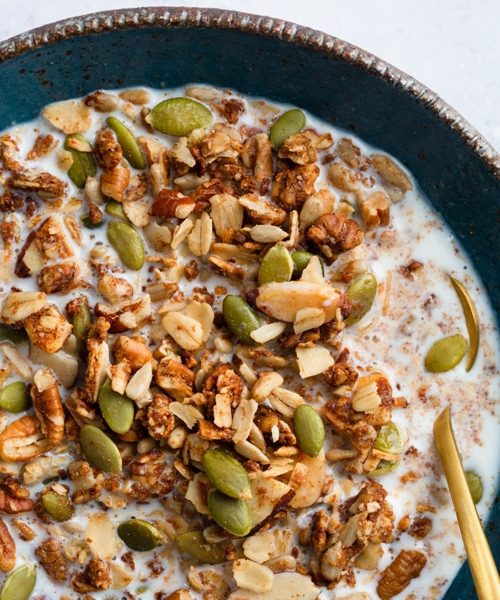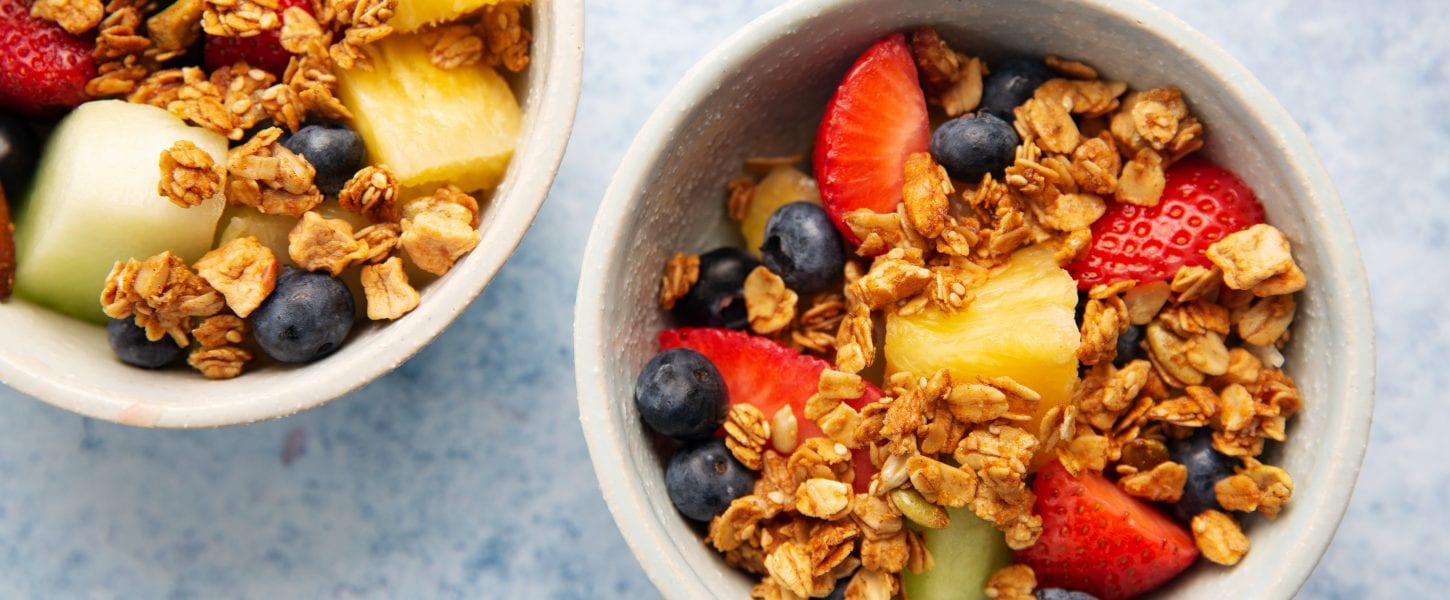Explore the many health benefits of granola, from weight loss and blood pressure support to improved digestion and more.
Granola is a sometimes complicated health food. While it is often celebrated for its wholesome ingredients and potential health advantages, some granola brands are also packed with sugar and additives that aren’t exactly supportive of your health.
At True North Granola, we’ve explored the health of granola before. We dug into the question, “is granola actually healthy?” and we also shared the key things to look for when choosing a healthy granola brand.
Now, we’re exploring the specific health benefits that granola can provide. Because here’s the thing: when you choose a nutrient-dense granola brand, the health benefits are many!
Understanding the Nutritional Profile of Granola
Granola is a nutrient-dense food that provides a complex combination of carbohydrates, dietary fiber, proteins, and fats, along with an array of vitamins and minerals. Understanding its nutrition facts can help you make informed choices about including it in your diet.
Key Vitamins and Minerals
Granola is a significant source of important vitamins and minerals. It is typically made from oats, which contain micronutrients like Vitamin E, folates, zinc, iron, selenium, copper, manganese, choline and more. These all play crucial roles in the human body.
Vitamin E is vital for immune function and skin health. Iron is crucial for transporting oxygen in the blood. Zinc and selenium, known for their antioxidant properties. You’ll also benefit from minerals like potassium, which aids in maintaining healthy blood pressure levels.
Carbohydrates and Fiber Content
The primary carbohydrate in granola comes from oats, which contribute to the total calorie content while also providing substantial dietary fiber. This fiber aids in digestion and can help you feel full longer, potentially aiding in weight management. Moreover, while granola does contain sugars, opting for versions with less added sugar and made with more natural sugar sources can maximize its health benefits.
True North Granola, for example, is made with pure maple syrup, date powder or Demerara sugar, depending on the variety. Our granola contains less than 6 grams of added sugar per serving, which is much lower than many brands on the market today. In fact, our First Date Granola actually contains less than 1 gram of sugar, as it is sweetened only with organic date powder.
Protein in Granola
Protein in granola contributes to its reputation as a hearty food that can sustain your energy levels. The protein content varies by brand and recipe but generally comes from nuts, seeds, and grains included in the mix. This protein is essential for building and repairing tissues in your body.
Fats in Granola: Healthy vs. Unhealthy
Granola contains fats, but the type of fat is crucial. Look for granola that includes healthy fats from nuts and seeds, which are beneficial for heart health. These can provide a mix of monounsaturated and polyunsaturated fats.
Be wary of granola high in saturated fat or trans fats, often due to added oils or coconut. Balance is key, and choosing granola with a higher proportion of healthy fats can be advantageous for your diet.
12 Health Benefits of Granola
Now that we understand what makes granola a healthy part of your diet, let’s dig deeper into what this nutrient-dense food can do for the human body. The health benefits of granola include:
Promoting Heart Health
Granola typically contains whole grains and nuts that are beneficial for your heart. These ingredients can help manage cholesterol levels, potentially reducing the risk of heart disease. The inclusion of nuts and seeds, which are good sources of healthy fats, contribute to the overall cardiovascular benefits of consuming granola as part of your diet.
Weight Management
Aiding in weight loss is another potential benefit of granola, especially if it’s high in fiber and d low in added sugars. High-fiber foods help you feel full longer, which can reduce your overall calorie intake. However, it’s important to watch portion sizes as granola can be calorie-dense.
Digestive Health
The high-fiber content in granola is excellent for your digestion. Dietary fiber can help regulate your digestive system, reducing the likelihood of constipation and aiding overall gut health. Soluble fiber, found in some types of granola, can be particularly beneficial as it forms a gel-like substance in the gut that helps with stool formation.
Blood Sugar Regulation
Consuming granola may have a positive effect on blood sugar regulation due to its fiber content. Fiber slows down the digestion of carbohydrates and the absorption of sugar, which can prevent blood sugar spikes after meals. However, this is dependent on the granola being low in added sugars and high in whole grains and other ingredients that have a low glycemic index.
Blood Pressure Support
Granola’s capacity to reduce blood pressure contributes to improved heart health. By alleviating strain on the cardiovascular system, it mitigates the risk of atherosclerosis, strokes, and other potentially life-threatening conditions.
Reduces Cholesterol Levels
The soluble fiber in granola is a well-known method for lowering harmful LDL cholesterol and promoting beneficial HDL cholesterol throughout the body. By diminishing unhealthy cholesterol levels, granola can help prevent plaque formation in arteries and veins. Opting for granola recipes featuring nuts like almonds and walnuts, rich in omega-3 fatty acids, further supports heart health.
Helps Manage High Blood Sugar
Oats are surprisingly rich in manganese, which plays a role in regulating blood sugar by stimulating or inhibiting insulin release. This is a great health benefit, especially for anyone managing diabetes.
Granola that uses natural sweeteners instead of refined sugars can also help manage diabetes while enjoying a sweet bite every once in a while. At True North Granola, our First Date granola variety, for example, is sweetened with date powder.
Support the Immune System
Granola, with its low levels of vitamin C, functions as a natural antioxidant, boosting the immune system. Choosing a granola variety with dried fruit, such as blueberries or cranberries, can increase the antioxidants you’re getting with each serving. All of the berries we use are infused with apple juice, not white sugar.
Boosts Gut Health
Granola contains ingredients beneficial for maintaining a healthy digestive tract. Compared to refined breakfast cereals, granola’s fiber reduces gut inflammation by increasing levels of beneficial gut bacteria, promoting overall gut health.
Supports Skin Health
Granola typically contains Vitamin E, which can help promote skin health by protecting against premature aging, sunburn, and wrinkles. Vitamin E also helps strengthen capillary walls, enhancing blood flow to extremities, benefiting hair follicles and nails.
Offers Plant-Based Protein
A valuable source of plant-based protein for those following a vegan diet, granola contains proteins from oats, seeds, and nuts. It’s a great way to get more protein in your diet outside of consuming meat. Several of our products are also vegan.
Boosts Energy
There’s a reason granola is often eaten as a breakfast food – it’s a great source of concentrated energy for your day (without overloading the body with sugar!). Manganese, a vital mineral in granola, activates tissues, ensures proper resource distribution, and optimizes metabolic function, meeting energy requirements.
Healthy Granola Ingredients and Varieties
Granola is made up of a variety of ingredients that contribute to its flavorful crunch and nutritional profile. Understanding these ingredients can help you make informed choices for a healthy diet.
Common Ingredients in Granola
A healthy granola mix typically consists of whole-grain rolled oats as the base, which provides a good amount of fiber. To add texture and rich flavors, nuts such as almonds, pecans, and walnuts are common, alongside e seeds such as sunflower and chia seeds.
While many commercial granola brands use white sugar (and lots of it) to sweeten their recipes, look for granola that uses natural sweeteners like maple syrup, date powder or Demerara sugar.
Dried fruits, including raisins, dried berries, and coconut flakes, are also frequently used to enhance the taste and nutrient content.
Oil is also a common ingredient in granola that can contribute to (or take away from) its health. Look for granola brands that use a less refined oil, such as organic sunflower oil or coconut oil.
Healthy Ways to Enjoy Granola
Granola can be a nutritious addition to your diet when you choose high-quality ingredients and are mindful of portion sizes. It’s versatile enough to be incorporated into various meals throughout the day, so there are many ways to eat granola.
As a Breakfast Option
For a satisfying and nourishing start to your day, use granola as a topping on yogurt or mix it into oatmeal to add crunch and flavor. Opt for granola with a base of whole grains and minimal added sugars. When pairing with yogurt, choose plain Greek yogurt to keep added sugars low and protein content high.
Snacking and Portion Sizes
Granola is often seen as a healthy snack, but portion size is key. A standard serving size is usually about 1/4 cup. To prevent overeating, measure out your snack ahead of time or opt for single-serving packages. Keep some in your bag or at your desk for a quick, energy-boosting snack.
Creative Recipes with Granola
Incorporating granola into homemade recipes can liven up your meals. Try it as a crunchy coating for baked fruit or as an ingredient in energy balls mixed with nuts and honey. Making homemade granola allows you to control the ingredients and sugar content, ensuring your concoction is as healthy as it is delicious. Pair granola with milk as a cereal or sprinkle over a salad for extra texture.
Potential Health Downsides of Granola
When incorporating granola into your diet, it’s important to be mindful of its sugar and calorie content, potential gluten and grain concerns, and the presence of additives and preservatives.
Sugar and Calorie Content
Granola can be a high-calorie food, with some varieties also containing high levels of added sugars. This combination can contribute to excessive calorie intake, which may lead to weight gain if not balanced with physical activity. Check the nutrition label for added sugars when choosing a granola brand.
Gluten and Grain Concerns
If you’re avoiding gluten due to celiac disease or gluten sensitivity, note that granola often contains oats, which can be cross-contaminated with gluten unless labeled gluten-free. Additionally, some people opt for grain-free diets for personal health reasons, so granola containing grains like wheat, barley, or rye might not align with all dietary preferences.
Additives and Preservatives
Some granola brands include additives and preservatives to extend shelf life and enhance flavor. You might encounter ingredients like sodium (salt) or artificial flavorings. To minimize your intake of unwanted additives, you may want to opt for granola that uses natural preservatives or has a shorter ingredient list.
Frequently Asked Questions
In this section, you’ll find detailed answers to common queries about granola and its impact on health, such as its skin benefits, weight concerns, and comparison with other foods.
What are the main ingredients in granola and how do they impact its nutritional value?
Granola typically comprises whole grains, nuts, and seeds, providing fiber, protein, and healthy fats that contribute to its nutritional profile. The specific ingredients can vary, affecting its overall health value.
How does granola compare to oats in terms of health benefits?
Oats are a key component of granola and are known for their heart-healthy fiber, particularly beta-glucan. Granola, depending on its ingredients, may offer similar benefits but usually comes with additional calories from sweeteners and oils.
What are the potential health effects of eating granola with yogurt?
Combining granola with yogurt can provide extra protein and probiotics, enhancing gut health and satiety. This pairing should be balanced with unsweetened yogurt and granola low in added sugar.
Ready to Experience the Health Benefits of Granola?
If you want the most health benefits from your granola, then it’s time to switch to a healthier granola brand. True North Granola is made with non-GMO ingredients, natural sweeteners and nutrient-dense foods like nuts, seeds and dried fruit.
If you have a specific dietary need, check out True North’s gluten-free, grain-free and nut-free granola varieties. There’s truly something for everyone!
Shop all True North healthy granola brands on our website.








